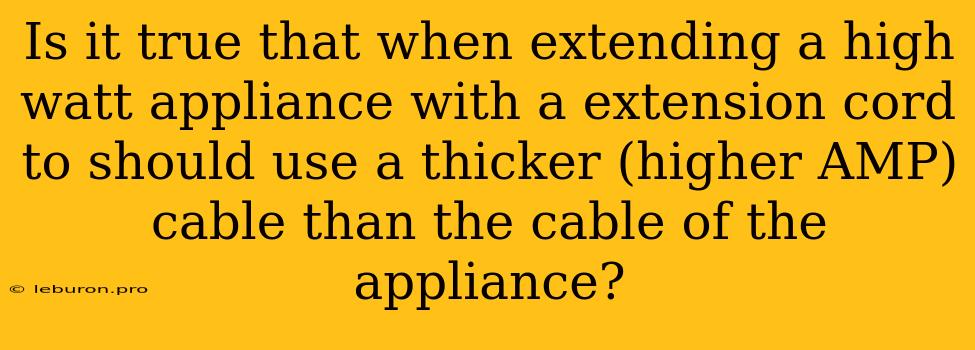The question of whether to use a thicker extension cord for high-wattage appliances is a common one, and the answer is a resounding yes. While it might seem intuitive to simply use the same cable thickness as the appliance's cord, using a thinner extension cord can lead to overheating, potential fire hazards, and even damage to your appliance. This is due to the fundamental relationship between electrical current, voltage, and resistance, which dictates how much power an extension cord can safely handle. Understanding these concepts is crucial for ensuring the safe and efficient use of extension cords with high-wattage appliances.
The Importance of Gauge and Amperage
The thickness of an extension cord is measured by its gauge, which is inversely proportional to the diameter of the wire. A lower gauge number indicates a thicker wire, capable of carrying a higher amperage (current). Amperage is the rate of flow of electrical charge, and it directly relates to the power an appliance consumes. Higher-wattage appliances demand a higher amperage to operate.
The Crucial Connection: Power, Voltage, and Current
The key to understanding why thicker extension cords are vital for high-wattage appliances lies in the relationship between power (measured in watts), voltage (measured in volts), and current (measured in amperes). These three quantities are interconnected by the following equation:
Power (Watts) = Voltage (Volts) x Current (Amperes)
This equation reveals that for a given voltage, a higher wattage appliance necessitates a higher current to function properly. If the extension cord is too thin (high gauge number), it will have a higher resistance. Resistance, in turn, hinders the flow of current, leading to a decrease in the voltage reaching the appliance. This can lead to the appliance underperforming, malfunctioning, or even failing altogether.
The Danger of Overloading Extension Cords
Overloading an extension cord with a high-wattage appliance can create a dangerous situation. The increased current flow through the thin wire generates excessive heat, posing a significant fire risk. This heat can also damage the insulation of the extension cord, potentially causing a short circuit or electrical shock.
Understanding Amperage Ratings
Every extension cord comes with an amperage rating, which indicates the maximum current it can safely handle. This rating is usually printed on the cord's label. It's crucial to ensure that the amperage rating of the extension cord is equal to or greater than the amperage drawn by the appliance. For instance, a 1500-watt space heater drawing 12.5 amps (assuming a standard 120-volt outlet) should only be plugged into an extension cord rated for at least 15 amps.
Choosing the Right Extension Cord for Your Appliance
Choosing the right extension cord for a high-wattage appliance involves considering the following factors:
- Appliance's Wattage: The wattage rating of the appliance will dictate the amperage it draws.
- Voltage: Ensure that the extension cord is compatible with the voltage of your home's electrical system.
- Cord Length: Longer extension cords have higher resistance, reducing the voltage reaching the appliance. Use the shortest possible extension cord that meets your needs.
- Gauge: Choose a cord with a gauge that corresponds to the amperage drawn by the appliance. Refer to a gauge chart to determine the appropriate gauge for a specific amperage.
Conclusion
Using a thicker extension cord for high-wattage appliances is crucial for ensuring safety and proper operation. It prevents overheating, reduces the risk of fire hazards, and protects your valuable appliances from damage. By understanding the relationship between power, voltage, current, and extension cord gauge, you can make informed choices that prioritize safety and efficient operation. Remember, always consult the appliance's manual for specific power requirements and follow the recommendations for extension cord usage. Using the correct extension cord will not only protect your property but also provide you with peace of mind.
